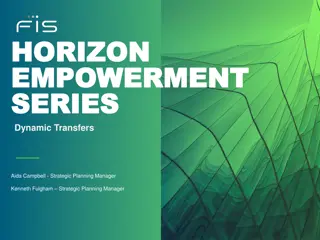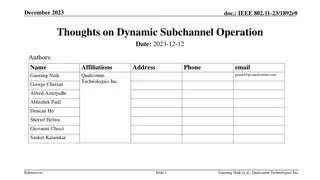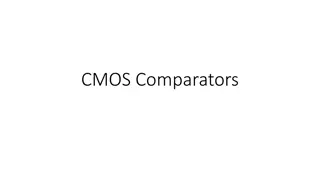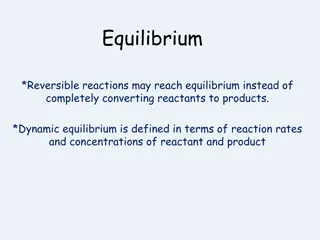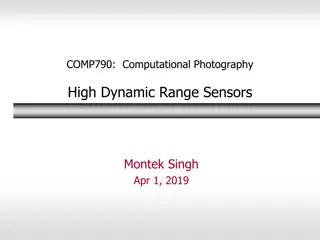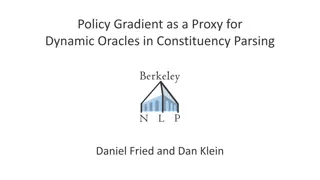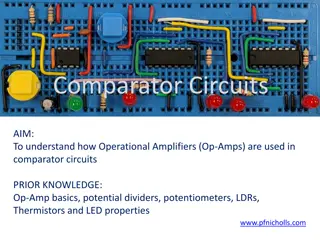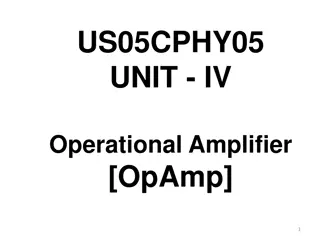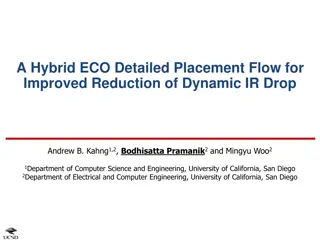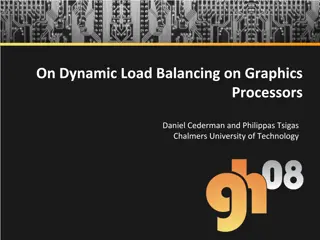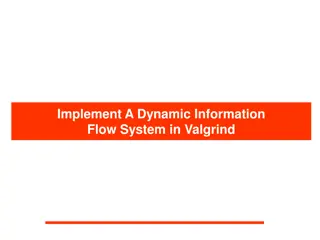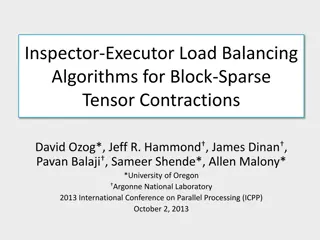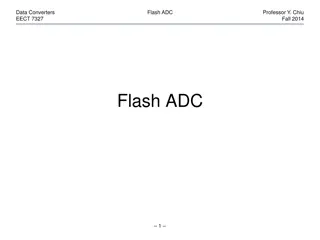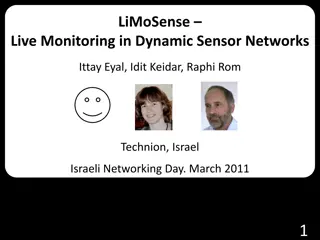[PDF⚡READ❤ONLINE] Planet Mercury: From Pale Pink Dot to Dynamic World (Springer
\"COPY LINK HERE ; https:\/\/getpdf.readbooks.link\/3319121162\n\n[PDF READ ONLINE] Planet Mercury: From Pale Pink Dot to Dynamic World (Springer Praxis Books) | Planet Mercury: From Pale Pink Dot to Dynamic World (Springer Praxis Books)\n\"\n
1 views • 6 slides
Dynamic Transfer Types and Reporting: Enhancing Financial Operations
Explore the various types of dynamic transfers such as ODP, Sweep, ZBA, and more, enabling seamless movement of funds across accounts. Learn about excess balance transfers, maintain minimum transfers, and the intricacies of dynamic transfer reporting. Discover key strategies for efficient financial
1 views • 12 slides
Understanding Magnitude Comparators in Digital Circuits
A magnitude comparator is a crucial component in digital circuits used to compare two numbers and determine their relative magnitudes. This comparison involves checking if one number is greater than, less than, or equal to the other. By analyzing the algorithm for equality and inequality, we can gra
7 views • 9 slides
Comparison Between Static and Dynamic Program Instrumentation
The difference between static and dynamic program instrumentation lies in when the analysis or measurement probes are inserted into a program. Static instrumentation occurs before the program is run and is more closely associated with proactive software evaluation. Dynamic instrumentation, on the ot
5 views • 14 slides
Dynamic Pricing Models in Air Cargo Transportation (1)
Dynamic pricing models are revolutionizing the way air cargo transportation businesses optimize revenue and improve customer satisfaction. Companies like Revenue Technology Services (RTS) are at the forefront of developing advanced pricing solutions that leverage real-time data and analytics to make
7 views • 6 slides
Dynamic Subchannel Operation in IEEE 802.11-23/1892r0: Enhancing Spectral Efficiency
The document discusses the implementation of Dynamic Subchannel Operation in IEEE 802.11 to address underutilization of bandwidth by narrowband devices. By allowing dynamic switching to secondary subchannels, the aim is to maximize spectral efficiency and enable communication with narrowband STAs on
0 views • 9 slides
Dynamic Pricing Strategies for Cargo Services by Revenue Technology Services
In today's fast-paced and competitive logistics industry, dynamic pricing has emerged as a pivotal strategy for maximizing revenue and improving efficiency. Revenue Technology Services (RTS), a leading provider of advanced cargo solutions, leverages dynamic pricing to optimize cargo service offering
1 views • 6 slides
Understanding Verbs: Action vs. State, Dynamic vs. Stative
Verbs are essential in sentences, describing actions or states of subjects. They can convey a sense of action like running or state like being. The distinction between dynamic (action) and stative (non-action) verbs is crucial, with dynamic verbs being used in continuous tenses and stative verbs des
0 views • 31 slides
Enhancing Economic Diversification in Central Africa through Leather Production
Leveraging experiences from successful comparators, particularly Ethiopia, this webinar explores skills for economic diversification in Central Africa, focusing on the leather industry. It examines livestock populations, raw hide and skin trading, animal husbandry challenges, raw hide and skin produ
0 views • 19 slides
Being a Dynamic Social Citizen: Start with Hello Week 2019-2020
Why is being a dynamic citizen important? Learn how connectedness can positively impact behavior and success in school. Explore key definitions like "Connectedness," "Dynamic," "Social Citizen," and "Inclusive," and discover a three-step guide on becoming a dynamic citizen by recognizing when peers
1 views • 17 slides
Dynamic Memory Allocation in Computer Systems: An Overview
Dynamic memory allocation in computer systems involves the acquisition of virtual memory at runtime for data structures whose size is only known at runtime. This process is managed by dynamic memory allocators, such as malloc, to handle memory invisible to user code, application kernels, and virtual
0 views • 70 slides
Understanding CMOS Comparators and Dynamic Comparators in Electronics
Explore the world of CMOS comparators and dynamic comparators in electronics, including concepts such as offset cancellation, fully-differential comparators, use of op-amps, speed-up techniques, small-signal models, and the need for RS latch in dynamic comparator circuits. Discover how these compone
0 views • 19 slides
Understanding Dynamic Equilibrium in Chemical Reactions
Explanation of reversible reactions, dynamic equilibrium, and the characteristics of equilibrium in chemical systems. Covers the concept of reversible reactions, dynamic equilibrium, rules for dynamic equilibrium, and examples to illustrate these concepts visually.
0 views • 54 slides
Pecuniary Penalties for Competition Law Infringements in Australia
Explore the setting of pecuniary penalties for competition law violations in Australia compared to other jurisdictions around the world. The report discusses the drafting process, structure, penalty setting in Australia, international comparators, and recommendations.
0 views • 46 slides
Enhancing Governance and Service Delivery: Insights from PNG Australia Governance Partnership
This presentation discusses the governance landscape in Papua New Guinea (PNG) with a focus on service delivery reform. It covers the methodology, findings, and implications of the PNG Australia Governance Partnership, highlighting key aspects such as country comparators, data collection, and assess
0 views • 20 slides
Eugene A. Nida - Pioneer of Dynamic Equivalence Bible Translation Theory
Eugene A. Nida (1914-2011) was a linguist who revolutionized Bible translation theory with his concept of dynamic equivalence. Through works like "Toward a Science of Translating," he shaped modern translation studies. Nida's theory distinguishes between formal and dynamic equivalence, favoring the
0 views • 10 slides
Understanding High Dynamic Range Sensors in Computational Photography
Dive into the world of High Dynamic Range (HDR) sensors in computational photography with topics covering sensor architectures, CMOS sensing techniques, dynamic range evaluation, and basic concepts related to image sensors and pixel integrators. Explore the importance of dynamic range in capturing a
6 views • 33 slides
Understanding Digital Logic Design Fundamentals
Delve into the intricate world of digital logic design with a focus on components like binary adders, subtracters, and comparators. Explore the concept of scale of integration and learn about MSI components and the realization of full binary adders. Discover how to simplify circuits and grapple with
0 views • 32 slides
Econometric Theory for Games: Complete Information, Equilibria, and Set Inference
This tutorial series discusses econometric theory for games, covering estimation in static games, Markovian dynamic games, complete information games, auction games, algorithmic game theory, and mechanism design. It explores topics like multiplicity of equilibria, set inference, and mechanism design
1 views • 23 slides
Dynamic Oracle Training in Constituency Parsing
Policy gradient serves as a proxy for dynamic oracles in constituency parsing, helping to improve parsing accuracy by supervising each state with an expert policy. When dynamic oracles are not available, reinforcement learning can be used as an alternative to achieve better results in various natura
0 views • 20 slides
Understanding Operational Amplifier (Op-Amp) Comparator Circuits
Operational Amplifiers (Op-Amps) are commonly used in comparator circuits to convert analog inputs to digital outputs. In comparator circuits, the Non-Inverting input being higher or lower than the Inverting input determines whether the output is ON or OFF. Real comparators like the 741 or 081 have
1 views • 14 slides
Understanding Operational Amplifiers (Op-Amps) and Their Applications
Operational Amplifiers (Op-Amps) are devices used to amplify signals using an external power source. They are composed of transistors, resistors, and capacitors. Op-Amps find applications in summing amplifiers, AC and DC signal processing, digital-to-analog converters, active filters, oscillators, r
1 views • 41 slides
Efficient Dynamic Memory Management for Embedded Multicore Systems
This content delves into the challenges of dynamic memory management in embedded multicore systems, emphasizing the importance of transaction-friendly approaches. It covers parallel data structures, the role of operating systems/libraries, and principles of memory allocation. Through illustrations a
0 views • 24 slides
Understanding Dynamic Rank Frameworks in Lucene/Solr
Explore the complexities of dynamic ranking in Lucene/Solr through various strategies such as static ranks, multiple field types, and dynamic score queries. Dive into the nuances of combining scores, Boolean operations, and the intricate dependencies between queries and data to enhance search releva
0 views • 49 slides
Hybrid ECO Detailed Placement Flow for Improved Reduction of Dynamic IR Drop
A study on dynamic IR drop challenges in 7nm technologies, proposing a hybrid detailed placement flow to reduce peak demand currents and improve voltage drop. The approach involves ILP formulation, clip generation, and experimentation to achieve significant reductions in dynamic voltage drop with en
0 views • 17 slides
Dynamic Memory Management Overview
Understanding dynamic memory management is crucial in programming to efficiently allocate and deallocate memory during runtime. The memory is divided into the stack and the heap, each serving specific purposes in storing local and dynamic data. Dynamic memory allocators organize the heap for efficie
0 views • 31 slides
Dynamic Load Balancing on Graphics Processors: A Detailed Study
In this comprehensive study by Daniel Cederman and Philippas Tsigas from Chalmers University of Technology, the focus is on dynamic load balancing on graphics processors. The research delves into the motivation, methods, experimental evaluations, and conclusions related to this critical area. It cov
0 views • 57 slides
Implementing a Dynamic Information Flow System with Valgrind
An in-depth guide on implementing a Dynamic Information Flow System (IFS) using Valgrind, a virtual machine that incorporates just-in-time compilation and dynamic recompilation. Explore IFS, its importance in confidentiality and taint analysis, memory reference error detection, data lineage, and mor
0 views • 21 slides
Dynamic Load Balancing in Block-Sparse Tensor Contractions
This paper discusses load balancing algorithms for block-sparse tensor contractions, focusing on dynamic load balancing challenges and implementation strategies. It explores the use of Global Arrays (GA), performance experiments, Inspector/Executor design, and dynamic buckets implementation to optim
1 views • 32 slides
Efficient Dynamic Skinning with Low-Rank Helper Bone Controllers
This research explores efficient dynamic skinning methods using low-rank helper bone controllers to achieve robust, simple, and high-performance skin deformation in computer graphics. By investigating linear blend skinning techniques and helper bone rigs, the study aims to address the wishlist of ga
0 views • 29 slides
Understanding Modern Non-inferiority Trial Designs in Antibiotic Development
This article discusses the significance of non-inferiority designs in advancing antibiotic development to combat multidrug-resistant bacteria. It emphasizes the importance of distinguishing between UDR, MDR, and XDR bacterial categories in trial design, highlighting challenges in selecting comparato
0 views • 12 slides
Understanding Flash ADC Architecture and Challenges
Explore the Flash ADC architecture designed by Professor Y. Chiu in Fall 2014, including the Vi reference ladder, thermometer code implementation, and typical CMOS comparators. Learn about the challenges faced in Flash ADC design, such as VFS specifications, comparator requirements, and resolution c
0 views • 36 slides
Challenges and Innovations in CXL 3.0 Dynamic Capacity Devices
Exploring the intricacies of CXL 3.0 Dynamic Capacity Devices presented at the LPC CXL micro conference 2023, focusing on asynchronous memory operations, partial extents, interleaving flow challenges, and memory sharing. The discussion delves into the dynamic capacity feature allowing memory changes
0 views • 17 slides
Discover the Benefits of Dynamic Yoga Practice
Dynamic Yoga is an ancient practice focusing on fluid and lively movements, offering immense health benefits such as toning internal organs, strengthening connective tissue, correcting spine alignment, enhancing breathing technique, and promoting mental clarity. Explore dynamic yoga poses like Chair
0 views • 5 slides
Understanding and Implementing Hysteresis in Comparator Circuits
Comparator circuits with hysteresis play a crucial role in signal processing applications. This article explores the theory behind comparator functions, hysteresis adjustment, and practical implementation using the TLV1701-Q1 series. Learn how to set up non-inverting and inverting comparators with h
0 views • 7 slides
Guide to Comparator Selection in Comparative Effectiveness Research
Proper selection of comparators is crucial in comparative effectiveness research to ensure the validity and clinical relevance of study results. This process involves choosing concurrent, active comparators from the same population, addressing potential biases, defining time zero for all comparator
0 views • 15 slides
Next Version Development for AlphaRad4 Sensor Front-End
In this project, the goal is to create the next version of the AlphaRad4 sensor front-end system by modifying the AlphaRad3 front-end to work with the sensors from AlphaRad4. The project involves various functional and electrical specifications, including gain ranges, comparators, counters, and diff
0 views • 18 slides
Real-time Monitoring in Dynamic Sensor Networks: LiMoSense Study
This study delves into LiMoSense, a live monitoring approach for dynamic sensor networks, exploring challenges such as correctness, convergence, and dynamic behavior. The research focuses on sensors' communication, aggregation of read values, and the use of bidirectional and unidirectional communica
0 views • 45 slides
Emerging Design and Analysis Approaches in COVID-19 Research
Dennis Ross-Degnan from Harvard Medical School discusses the NEXT-D lessons for COVID-19 research, focusing on study design, bias reduction, data metrics, and the value of long-term research consortia like NEXT-D. The content covers interventions, comparators, observational study design issues, and
0 views • 11 slides
Understanding Dynamic Loading and Linking in Memory Management
This presentation covers the concepts of dynamic loading and linking in memory management, discussing how programs and data are managed in physical memory, the advantages of dynamic loading, and the process of dynamic linking for system language libraries. The use of stubs for locating memory-reside
0 views • 12 slides
![[PDF⚡READ❤ONLINE] Planet Mercury: From Pale Pink Dot to Dynamic World (Springer](/thumb/21549/pdf-read-online-planet-mercury-from-pale-pink-dot-to-dynamic-world-springer.jpg)
